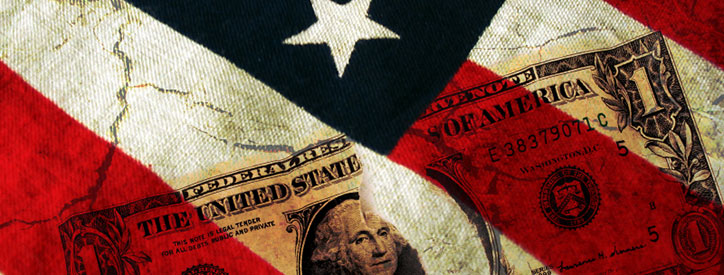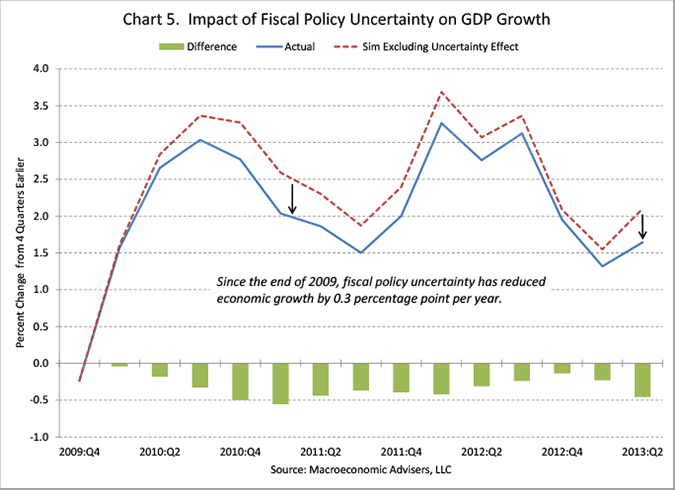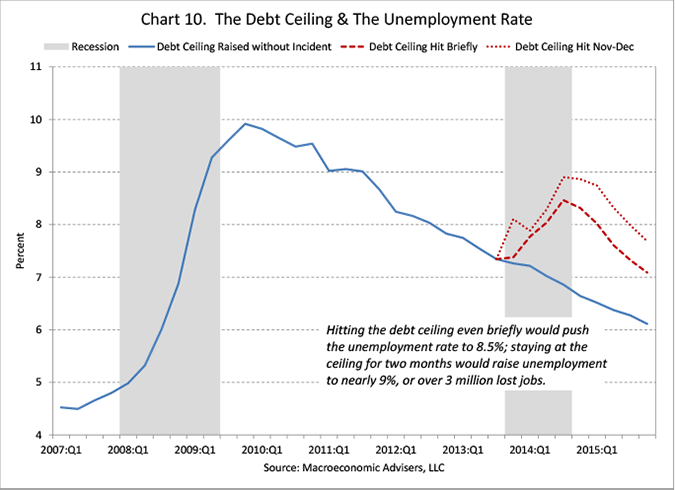You are here
The Cost of Crisis-Driven Fiscal Policy
Prepared by Macroeconomic Advisers, LLC for the Peter G. Peterson Foundation
 Download the PDF
Download the PDF
Even as Congressional leaders and the president discuss a potential temporary solution to the current stalemate over the government shutdown and the debt ceiling, the repeated cycle of lurching from crisis to crisis has significant and real costs to the U.S. economy.
A new report, prepared by Macroeconomic Advisers, LLC for the Peter G. Peterson Foundation, examines the cost of crisis-driven fiscal policy over the past few years by looking at indicators including GDP growth, the unemployment rate and the corporate credit spread. The paper considers recent policy and political battles including the sequester, the government shutdown and brinksmanship on the debt ceiling.
Top-level findings include:
Fiscal Policy Uncertainty: Since late 2009, fiscal policy uncertainty has raised the Baa corporate bond spread by 38 basis points, lowered GDP growth by 0.3 percentage points per year, and raised the unemployment rate in 2013 by 0.6 percentage points, equivalent to 900,000 lost jobs.
Government Shutdown: A 2-week partial government shutdown would directly trim about 0.3 percentage points from 4th-quarter growth.
The Debt Ceiling: The paper considers two scenarios. The first assumes a brief, technical default that is quickly resolved, and the second assumes an extended, two-month stalemate.
In scenario one, risk aversion rises, financing costs rise, prices of risk assets fall, and the economy enters a recession. Exacerbated by the Fed’s inability to lower short-term interest rates, growth only begins to rebound at end of 2014 and the unemployment rate rises to a peak of 8.5% before starting to decline. At its peak, 2.5 million jobs would be lost.
Scenario two implies a longer and deeper recession than in the first scenario, but one characterized by extreme volatility. Annualized GDP growth fluctuates rapidly between plus and minus 8% until the oscillations diminish in 2015. Unemployment rises to a peak of 8.9% — equivalent to 3.1 million lost jobs — before trending down.
Discretionary Spending: Reductions in discretionary spending have reduced annual GDP growth by 0.7 percentage points since 2010 and raised the unemployment rate 0.8 percentage points, representing a cost of 1.2 million jobs.


Read the press release here.
About Macroeconomic Advisers
Macroeconomic Advisers is a leading independent research firm focused on the U.S. economic outlook, monetary policy, and fixed income markets. The firm combines rigorous analytical methods with an unmatched understanding of how monetary policy is conducted, offering unbiased and thoughtful analysis of where the U.S. economy is headed.
About the Peter G. Peterson Foundation
The Peter G. Peterson Foundation is a nonprofit, nonpartisan organization established by Pete Peterson — businessman, philanthropist and former U.S. Secretary of Commerce. The Foundation is dedicated to increasing public awareness of the nature and urgency of key long-term fiscal challenges threatening America's future and to accelerating action on them. To address these challenges successfully, we work to bring Americans together to find and implement sensible, long-term solutions that transcend age, party lines and ideological divides in order to achieve real results. To learn more, please visit www.pgpf.org.

